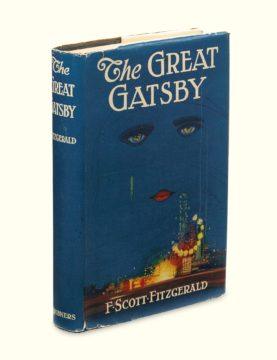Parul Sehgal in The New York Times:
 One of the pleasures of writing about a book as widely read as “The Great Gatsby” is jetting through the obligatory plot summary. You recall Nick Carraway, our narrator, who moves next door to the mysteriously wealthy Jay Gatsby on Long Island. Gatsby, it turns out, is pining for Nick’s cousin, Daisy; his glittering life is a lure to impress her, win her back. Daisy is inconveniently married to the brutish Tom Buchanan, who, in turn, is carrying on with a married woman, the doomed Myrtle. Cue the parties, the affairs, Nick getting very queasy about it all. In a lurid climax, Myrtle is run over by a car driven by Daisy. Gatsby is blamed; Myrtle’s husband shoots him dead in his pool and kills himself. The Buchanans discreetly leave town, their hands clean. Nick is writing the book, we understand, two years later, in a frenzy of disgust.
One of the pleasures of writing about a book as widely read as “The Great Gatsby” is jetting through the obligatory plot summary. You recall Nick Carraway, our narrator, who moves next door to the mysteriously wealthy Jay Gatsby on Long Island. Gatsby, it turns out, is pining for Nick’s cousin, Daisy; his glittering life is a lure to impress her, win her back. Daisy is inconveniently married to the brutish Tom Buchanan, who, in turn, is carrying on with a married woman, the doomed Myrtle. Cue the parties, the affairs, Nick getting very queasy about it all. In a lurid climax, Myrtle is run over by a car driven by Daisy. Gatsby is blamed; Myrtle’s husband shoots him dead in his pool and kills himself. The Buchanans discreetly leave town, their hands clean. Nick is writing the book, we understand, two years later, in a frenzy of disgust.
Fitzgerald was proud of what he had achieved. “I think my novel is about the best American novel ever written,” he crowed. The book baffled reviewers, however, and sold poorly. “Of all the reviews, even the most enthusiastic, not one had the slightest idea what the book was about,” Fitzgerald wrote to the critic Edmund Wilson. That matter remains unsettled. The book has been treated as a beautiful bauble, fundamentally unserious. In a 1984 essay in The Times, John Kenneth Galbraith sniffed that Fitzgerald was only superficially interested in class. “It is the lives of the rich — their enjoyments, agonies and putative insanity — that attract his interest,” he wrote. “Their social and political consequences escape him as he himself escaped such matters in his own life.”
This interpretation has been turned on its head. Both new editions make light of the book’s beauty — it’s the treatment of the grotesque that is so compelling (Morris compares the characters to the “Real Housewives”). Both make the case that the book’s value lies in its critique of capitalism. Lee describes Fitzgerald as “a fan of Karl Marx,” and writes that “Gatsby” remains “a modern novel by exploring the intersection of social hierarchy, white femininity, white male love and unfettered capitalism.” For Morris, too, there is no romance between Gatsby and Daisy but “capitalism as an emotion”: “Gatsby meets Daisy when he’s a broke soldier, senses that she requires more prosperity, so five years later he returns as almost a parody of it. So the tragedy here is the death of the heart.”
More here.
